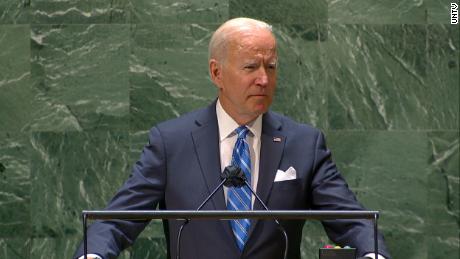The top US diplomat, speaking to reporters at the UN General Assembly, said that he had met with French Foreign Minister Jean-Yves Le Drian as the administration tries to mend ties ruptured over the US announcement of the “AUKUS” alliance with the UK and Australia and agreement to provide nuclear-powered submarines to Australia — submarines that France had expected to sell to Canberra.
“We recognize this will take time and hard work, and will be demonstrated not only in words, but in deeds, and I’m committed to working closely with Minister Le Drian on this crucial effort,” Blinken said about repairing the rift that led France to recall its ambassador from Washington.
Tarnished by crises
The US acted as host to the 76th session of the global diplomatic gathering — reduced in size and ambition due to the Covid-19 pandemic — at a time when the Biden administration’s standing on the world stage has been tarnished by the foreign policy crises of Afghanistan, the diplomatic spat with France and condemnation of its treatment of Haitian refugees. Another major foreign policy goal — reviving the Iran nuclear deal — has stalled as Tehran’s new President has declined to engage in the talks in Vienna.
Blinken pointed to two major challenges the world faces — the Covid-19 pandemic and climate change — and called on the world to do more. “When it comes to both the pandemic and climate, the international response isn’t as aggressive as it needs to be,” he said. “And that’s what we were trying to continue to work hard, to emphasize here this week and in the days and weeks ahead.”
But the bulk of questions Blinken fielded were about the diplomatic missteps and foreign policy challenges the Biden administration is facing.
Asked about the fiery denunciations of former Special Envoy for Haiti Daniel Foote, who resigned while calling the Biden administration policy on Haitian refugees “inhumane,” Blinken thanked Foote for his service, even as senior State Department officials publicly criticized the former envoy.
Foote condemned the administration’s “inhumane” decision to deport Haitian refugees and the “deeply flawed” US policies on Haiti, saying he will “not be associated with the United States’ inhumane, counterproductive decision to deport thousands of Haitian refugees” from the US-Mexico border.
“People bring strongly held views to pretty much every issue that we deal with, and especially when it’s an issue that engenders real passion, like Haiti,” Blinken said. “The level of desperation among the migrants is something that can’t help but powerfully affect all of us, and so I really understand the passion that comes with this, and I understand Dan’s passion. But that’s also why both on a personal level and institutionally, we are committed to doing all we can to support the people of Haiti now and going forward.”
The Biden administration is grappling with an influx of thousands of migrants, many of whom are Haitian, at the US-Mexico border in Del Rio, Texas. The administration has repeatedly vowed in public statements that the migrants will be turned away, drawing the ire of many Democrats and human rights groups, who say it is inhumane to return the migrants because of Haiti’s humanitarian crisis.
‘Remain united’
Images of Border Patrol officials on horseback using aggressive tactics when confronting Haitians have drawn widespread criticism.
Blinken also discussed Afghanistan, another difficult issue for the Biden administration after the chaotic withdrawal from the country, saying it had been the focus of discussions throughout his time at the annual General Assembly. “Across those meetings, we underscored how critical it is that the international community remain united” in its approach to the Taliban as the group continues to seek legitimacy and international support, he said.
The US message to the international community is that any legitimacy or support for the Taliban has to depend on them meeting commitments in key areas: “allowing foreign nationals and Afghans to travel outside the country if they wish; preventing terrorist groups from using Afghanistan as a base for external operations to threaten other countries; respecting basic human rights, particularly for women, for children, for members of minority groups; refraining from carrying out reprisals; allowing unimpeded humanitarian access; and forming a genuinely inclusive government that can meet the basic needs and reflect aspirations of the Afghan people,” Blinken said.
He also acknowledged that there’s been little movement on returning to the Iran nuclear talks.
“We don’t have yet an agreement by Iran to return to the talks,” Blinken said. “The question is whether and, if so, when Iran is prepared to do that.”
He said the US has been “very sincere and very steadfast” in its attempts to get back to mutual compliance with the nuclear deal and to address “the full range of concerns that we and many other countries have with Iran.”
Earlier Thursday, a senior State Department official said the US is working on contingency plans in case Iran continues to make nuclear advances and fails to return to international talks. The official added that as the US and allies wait for Tehran to return to nuclear talks, their patience may soon wear thin.
“Any government would do this,” the official said, speaking Thursday on the margins of the United Nations General Assembly about the nuclear deal formally known as the Joint Comprehensive Plan of Action. “We obviously have to look at what we will do if we conclude that Iran is either not interested in coming back to the JCPOA or its nuclear advantage is such that it doesn’t make sense for JCPOA to have been hollowed out.”
The official said it’s the preference of the US and allies “to come back to the table,” and added that if there is any concern about a Plan B, it’s “the one that Iran, where they want to continue to build that and not be seriously engaged to return to the JCPOA.”






